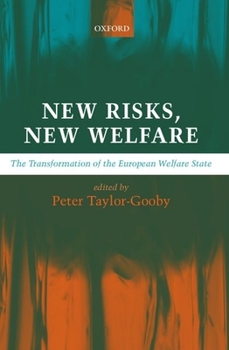New Risks, New Welfare: The Transformation of the European Welfare State
Select Format
Select Condition 
Book Overview
This book introduces the concept of new social risks in welfare state studies and explains their relevance to the comparative understanding of social policy in Europe. New social risks arise from shifts in the balance of work and family life as a direct result of the declining importance of the male breadwinner family, changes in the labor market, and the impact of globalization on national policy-making. They differ from the old social risks of the...
Format:Paperback
Language:English
ISBN:0199267278
ISBN13:9780199267279
Release Date:January 2005
Publisher:Oxford University Press, USA
Length:248 Pages
Weight:0.89 lbs.
Dimensions:0.6" x 6.3" x 9.1"
Customer Reviews
0 rating





